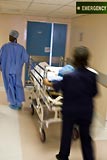
Hospital acquired infections are those you get from a health care facility.
While it probably comes as no surprise that hospital acquired infections (HAI) are dangerous and can be deadly, a study in the Archives of Surgery show that they are now among the top 5 causes of death in the US.
HAIs are infections you pick up while being treated in the hospital. They can also be picked up by the healthcare staff who work there. HAIs can happen to people admitted for surgery or for being treated for accidents, traumas or burns. These infections are most often bacterial, such as Staph, MRSA, Pseudomonas, Acinetobacter, Klebsiella, or C. diff, but can occasionally be fungal organisms as well.
The study also found that patients with sepsis (infection of the blood) had a 6 times higher risk of death than patients who were not infected. Healthcare costs were also 2.5 times higher than patients without infection. Curiously, the results showed that women were 30% less likely to have HAIs then men.
The CDC states that in the US, urinary tract infections, central-line bloodstream infections and ventilator associated pneumonia account for the majority of HAIs. Catheters are often a cause of infection because they can become infected with a biofilm of bacteria. Biofilms are a common way some bacteria (like Staph or MRSA) are resistant to many forms of treatment, including antibiotics.
Many hospitals are increasing their internal monitoring of infections. And because healthcare facilities are often a breeding ground for antibiotic resistant bacteria, facilities who have also initiated antibiotic stewardship programs have found them to be effective in reducing the incidence of antibiotic resistance.
To your best health,
Michelle
References:
“Increases in mortality, length of stay, and cost associated with hospital-acquired infections in trauma patients,” Glance, Stone, Mukamel, Dick; March 21, 2011, Archives of Surgery
Hospital-acquired infections dramatically increase trauma patients’ risk of in-hospital death and hospital stay, Agency for Healthcare Research and Quality. https://www.ahrq.gov/research/aug11/0811RA3.htm
Photo Credit: ©iStockPhoto/poco_bw, hospital




